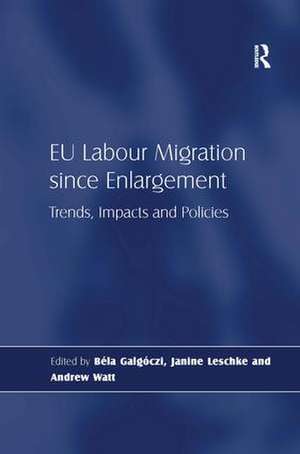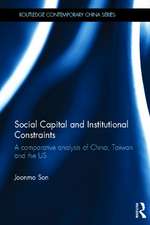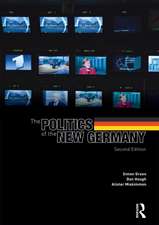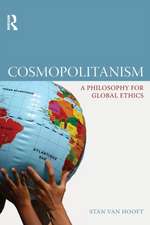EU Labour Migration since Enlargement: Trends, Impacts and Policies
Autor Béla Galgóczi, Janine Leschkeen Limba Engleză Hardback – 10 iun 2009
Preț: 1000.27 lei
Preț vechi: 1219.84 lei
-18% Nou
Puncte Express: 1500
Preț estimativ în valută:
191.45€ • 199.12$ • 160.44£
191.45€ • 199.12$ • 160.44£
Carte tipărită la comandă
Livrare economică 13-27 martie
Preluare comenzi: 021 569.72.76
Specificații
ISBN-13: 9780754676843
ISBN-10: 0754676846
Pagini: 336
Ilustrații: includes 40 tables, 36 figures & 2 maps
Dimensiuni: 156 x 234 x 21 mm
Greutate: 0.45 kg
Ediția:New ed
Editura: Taylor & Francis
Colecția Routledge
Locul publicării:Oxford, United Kingdom
ISBN-10: 0754676846
Pagini: 336
Ilustrații: includes 40 tables, 36 figures & 2 maps
Dimensiuni: 156 x 234 x 21 mm
Greutate: 0.45 kg
Ediția:New ed
Editura: Taylor & Francis
Colecția Routledge
Locul publicării:Oxford, United Kingdom
Recenzii
Selected as one of the Princeton University Industrial Relations Section's 'Noteworthy Books' in Industrial Relations and Labor Economics for 2009. 'In recent years many citizens of new EU member states entertained hopes that EU enlargement would give them access to better jobs in western Europe. Many in western Europe, on the other hand, initially feared increased competition on their home labour markets in the belief that it would generate higher unemployment and lower wages. This book carefully analyses the major effects and policy responses in both the sending and the receiving countries. The authors, in their conclusions, are able to replace the publicly expressed hopes and fears by a much more nuanced view. The book is essential reading for anyone interested in the issue of labour mobility within an enlarged EU and its effects on sending and receiving societies.' Rainer Münz, Senior Fellow, Hamburg Institute of International Economics, Germany 'EU Labour Migration since Enlargement represents the first serious attempt to assess the real impacts of the accession of eight central and eastern European new member states in 2004, followed by two in 2007. As such, it is a welcome antidote to the ad hoc way in which evidence is usually presented in the debate about intra-EU labour migration.' Runnymede Bulletin 'As the first attempt to analyse both developments in European migratory dynamics since the 2004 EU enlargement, and policy responses by various stakeholders in both receiving and sending countries, this book is an insightful read for everyone interested in European labour market, population and integration studies.' Work, Employment and Society
Notă biografică
Béla Galgócz, European Trade Union Institute, Belgium, Janine Leschke is associate professor at the Department of Business and Politics at Copenhagen Business School, Denmark and Andrew Watt, formerly senior researcher at the European Trade Union Institute in Brussels, since 2012 Andrew Watt has been head of the Macroeconomic Policy Institute (IMK) department of the Hans-Böckler Foundation.
Cuprins
1: Intra-EU Labour Migration — Flows and Policy Responses; 2: The Dimensions and Effects of EU Labour Migration in the UK; 3: EU Labour Migration: Government and Social Partner Policies in the UK; 4: The Dimensions and Effects of EU Labour Migration in Sweden; 5: EU Labour Migration: Government and Social Partner Policies in Sweden; 6: The Dimensions and Effects of EU Labour Migration in Germany; 7: EU Labour Migration: Government and Social Partner Policies in Germany; 8: The Dimensions and Effects of EU Labour Migration in Austria; 9: EU Labour Migration Government and Social Partner Policies in Austria; 10: Dimensions and Effects of Labour Migration to EU Countries: The Case of Poland; 11: Labour Emigration: Government and Social Partner Policies in Poland; 12: Dimensions and Effects of Labour Migration to EU Countries: The Case of Hungary; 13: Labour Emigration: Government and Social Partner Policies in Hungary; 14: Dimensions and Effects of Labour Migration to EU Countries: The Case of Latvia; 15: Labour Emigration: Government and Social Partner Policies in Latvia
Descriere
The debate about the opening-up of labour markets in the enlarged European Union is crucial for the ongoing process of European integration. The contributions to this book shed light on the dimensions, characteristics and impacts of labour migration between selected sending (Hungary, Latvia and Poland) and receiving (Austria, Germany, Sweden and the UK) countries.













